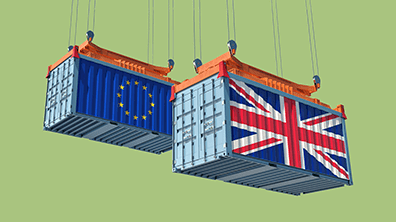ICAEW Insights speaks with industry professionals from the trade and logistics sector to assess the effects of major factors such as climate change goals, the COVID-19 pandemic and Brexit.
At a webinar entitled ‘Digitalization and logistics resilience — lessons learned from COVID-19 and challenges ahead’, World Trade Organization (WTO) Deputy Director-General Anabel González highlighted: “As trade is more and more organised through value chains, be it global or regional, logistics services are the glue that holds value chains together.”
This acceleration was felt first hand by American global shipping and logistics company UPS, which feels its global supply chain has been changing at a high pace since the start of the pandemic.
Brokerage division manager at UPS Europe Walter Van der Meiren said: “COVID-19, emerging technologies and regulators are changing the way we do business. The European Union’s Green Deal aims to make it the first climate-neutral continent by becoming a modern, resource-efficient economy.
“The Carbon Border Adjustment Mechanism (CBAM) is a climate measure that should prevent the risk of carbon leakage and support the EU's increased ambition on climate mitigation, while ensuring WTO compatibility.”
Together with a Europe fit for the digital age, which aims to empower people with a new generation of technologies, these objectives will have a significant impact on policy making, says Meiren, who believes the UK is very ambitious to realise the same objectives.
Trade competitiveness of the UK
González also stated that numerous studies have shown that a country's competitiveness correlates highly with its logistics performance, which relies on not only infrastructure – so-called hardware – but also software, namely the ability to supply cost-effective logistics services and the enabling environment. Where does this leave the UK?
“I do not believe that the UK is at any disadvantage to any other country in this regard,” said Phillip Curran, Director of Finance at freight and cargo services company Cargo Overseas. “There are many UK software and technology companies that are entering the logistics sector. The UK workforce contains the skill base capable of delivering innovative solutions to the challenges presented by global logistics.”
Historically, the UK logistics sector has had a relatively low profile and was undervalued in terms of what people were willing to pay. This has made it difficult to attract the best talent when it comes to operators, as well as those with the skills to help digitisation. Curran thinks the increase in national reporting of the problems in the UK supply chain will attract more investment and interest in the industry.
“In terms of context, prior to the pandemic Cargo Overseas did not directly employ any software developers. We now have three full-time people in these roles,” he added.
Curran sits on the ICAEW Global Trade Community Advisory Group, where professionals share insight and technical expertise, and raise issues and challenges.
Brexit roadblocks
When looking at the problems that Brexit poses, UPS and Cargo Overseas have experienced a similar dilemma – both companies are having to deal with an influx in added customs declarations following the UK withdrawal from the EU.
Meiren explained that this required UPS Europe to change customs authorisations, invest in new buildings, hire and train additional staff, and educate its customers, some of whom are new to customs clearance formalities. “We rely on the availability of experienced customs staff, which in all countries is still not guaranteed,” he said.
The same problem was met with a digital solution at Cargo Overseas. It spent 18 months prior to Brexit developing a software solution called ACE, which enabled UK companies to submit their own customs clearances with minimum interaction from customs brokers.
Curran said: “It simplifies and validates the process for people with little or no experience. The system is now used by UK corporates and has been nominated for an innovation award at our industry body awards.”
What role do accountants play?
Accountants should emphasise the importance of knowledge in customs matters. Knowledge of customs rules ensures that their customers can run a compliant, legitimate business while also optimising their bottom line.
Meiren explained that one example would be with Rules of Origin, which determine if goods are eligible for preferential tariffs (duty-free or reduced duties) based on the Free Trade Agreements decisions. “It is thus essential to understand those rules to benefit from a possible reduction of customs duties and taxes. Determining the country of origin can either be very simple or very complex as it varies from one agreement to the other and between products.”
Successful logistics requires an analysis of risks and potential consequences, “which is a skill set well suited to accountants”, says Curran. “In the current operating environment, it is important that accountants need to understand the length and vulnerabilities in their supply chains and have contingencies.”
He continued: “When there is an increase in complexity of running a business, such as that caused by Brexit, people will inevitably turn to their accountants for information and advice. It is important that we, as accountants, understand the implications of these changes and know where we can find the correct information.”
Here is a link to the webinar hosted by Deputy Director-General Anabel González: Digitalization and logistics resilience — lessons learned from COVID-19 and challenges ahead.
Trade: clean growth and tech
Clean growth and the application of major emerging technologies to existing sectors are two key characteristics of trade in 2022. Add to these levelling up supported by foreign direct investment, and there are exciting future prospects for business and the prosperity of communities globally.




